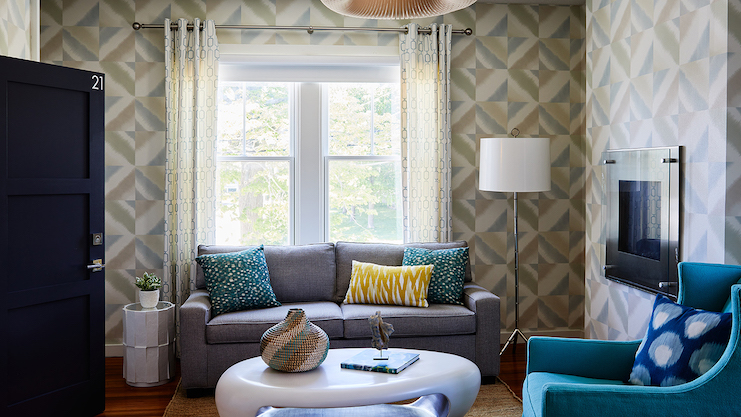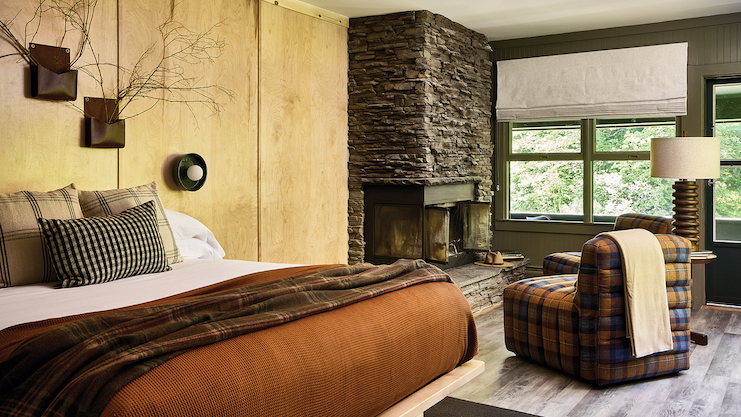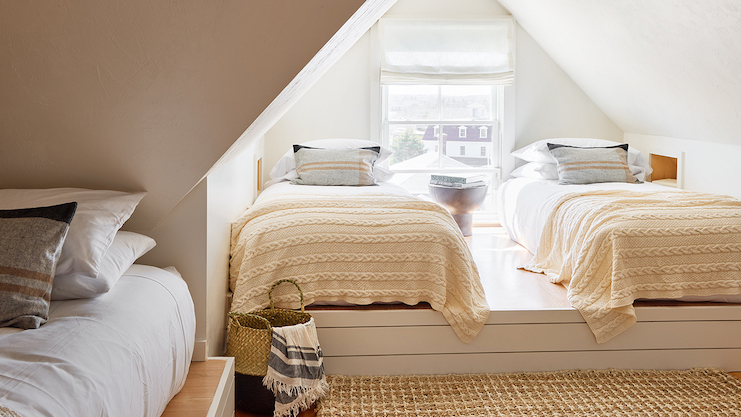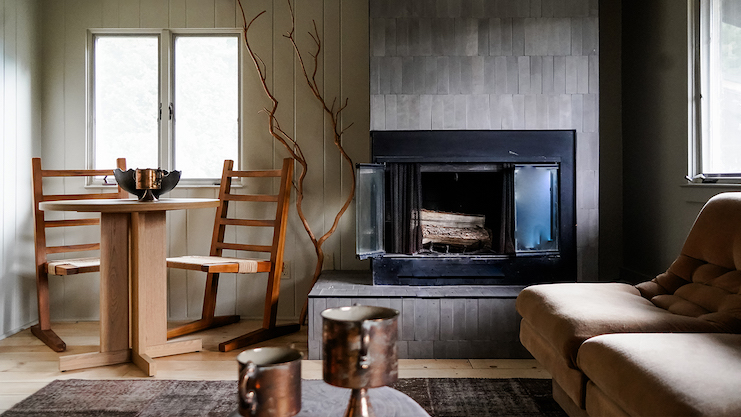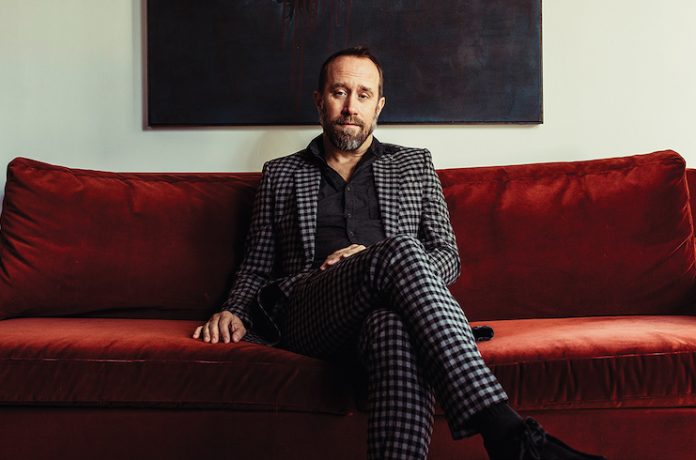
Lark Hotels founder Robert Blood wears many hats these days. In addition to serving as president of the boutique hotel brand and management company he founded in 2012, he’s also a principal at design firm Elder & Ash and a partner at investment and development subsidiary Lark Capital. Describing his unusual journey from English major to hotelier, Blood says he’s personally proven the idea that the “right mindset” is the most important qualification for success in the hospitality industry. The company is now going strong, he says—in fact, it’s nearly doubled in size since 2020, when he finally convinced longtime friend and colleague Peter Twachtman to take over day-to-day operations as CEO and focus on what he does best and loves best—“creative vision, strategic growth, and brand advancement.”
Early days
Brad recalled his love of hospitality while he was a student at Bates College, where he was a member of the Student Activities Board responsible for creating entertainment experiences, worked as a ski instructor at Sugarloaf, and dreamed of owning a popular bar and inn. He added that his father’s untimely death helped shape his attitude toward life and perhaps pushed him toward the hospitality industry. “My parents had said that when they were 55, they were going to retire and open a bed and breakfast,” he said.
However, it wasn’t until he and his then-girlfriend Leigh (who would become his first wife) worked as innkeepers on Nantucket for Susan and Dale Hamilton that he truly experienced the work that went into running such a business and, more importantly, how much he loved the job. “Even though we had no experience at all, they handed us the keys and left us to run it ourselves. With Dale and Susan’s support, friendship, and guidance, we learned the business inside and out,” Brad says. From that year-long experience, he decided how he wanted to live and work. “From the moment I set foot on Nantucket and became innkeepers at the Shelburne Inn, I decided I was doing something I truly loved, and it was more than just a job, it was a lifestyle.”
His own hotel
While considering opening his own hotel, Brad became interested in what would later become known as the boutique hotel industry based on his experience at the Sherburne Inn: “People love staying there, mostly because of the immersive environment and experience.” However, he soon realized that investing in boutique hotels was another ballgame altogether: “Luckily, I didn’t go to Cornell Hotel School, so I wasn’t aware of the consensus that it was impossible to make a hotel under 100 rooms profitable.”
Fortunately, his mother, against the advice of well-meaning friends, made a down payment after reading his business plan, which was developed with the help of Harvard Business School graduate Dale Hamilton. Hamilton had proven through his Sherburne Inn that a small property in a good location could be financially viable. So with a $350,000 loan from his mother (10-year note at 6%), an SBA loan, and traditional bank financing, he was able to purchase his first property, a 9-room inn in Kennebunkport, Maine, in 2004 for $1.725 million.
Brad says this first property “was like a test lab for us. Leigh and I became experts at cost control and learned how to run a very disciplined business.” He says they also learned the value of investing in repositioning and design. “People really liked the independent spirit of our hotel because it felt very local. We found that by making smart renovation and design choices, we could really increase revenue.”
Through trial and error and hard work, they developed a set of operating principles that work. “I wanted to elevate the experience of these small historic buildings to make them more enjoyable for a more modern traveler—we replaced the table mats and macramé with modern amenities and comforts while paying homage to New England’s charm and history.”
Their risk paid off. Four years after Captain Fairfield Inn opened, they successfully completed a cash-out refinancing that enabled him to pay off his mother’s debt in half the time.
Between refinancing the property and founding Lark Hotels in 2012, he made other investments, including The Veranda House and Chapman House on Nantucket, which he purchased with the Hamilton family, and The Attwater in Newport, Rhode Island, which he purchased with his mother and sister. He also provided consulting services to hotels and resorts from 2007 to 2012.
From Ownership to Partnership
A lot has changed since Brad founded Lark Hotels, which he says is now “a management company and brand” that doesn’t own the hotels in its portfolio. However, as president, Brad does co-own 22 of the hotels with investors through Lark Capital, Lark’s affiliated investment and development arm launched in 2022. Since he and his second wife, Megan Kennedy, founded Elder & Ash in 2017, the company has also opened a full-service design studio open to everyone.
Currently, Lark’s portfolio has grown to 53 hotels. In addition to Lark Hotels, it also includes “sister brands” created to meet the needs of other market segments for special brands: Bluebird by Lark, AWOL and Blind Tiger guest houses. In addition, Lark Independent extends the benefits of its expanded infrastructure to other independent properties, including actual operations, technology, design, human resources and revenue support.
The Right Mindset
Working with stay From one of his most prized “unique locations,” his Block Island beach house in New Shoreham, Rhode Island, Brad describes the many ways working in the boutique hospitality industry has allowed him to “live the dream”: “While I wouldn’t say I grew up with a passion for hotels or restaurants, I do have an innate desire to create experiences. I also really enjoy architecture and being a steward of historic buildings that play an important role in the community.” He also has what he describes as “the right mindset”: “You have to be willing to work hard, try new things, and love what you’re doing. We do work that almost anyone can do—we make pillows, make sure drinks are good, and the corners of the hospital are tidy. We’re good at what we do because of how we make people feel.”
What he’s most grateful for: “The beauty of my life is that I get to work with my two best friends and a whole team of amazing people while creating amazing experiences for people.”
Mentors are important: Give credit where it’s due
Unlike those who are born into the hospitality industry, Lark Hotels founder Robert Bullard considers himself lucky to be in it. He is not above mentioning the people who helped him realize a dream he never realized he had.
Of course, it all starts at home, with his parents. He calls his mother “my biggest supporter and my biggest believer. She ignored friends who tried to dissuade her from investing in his first home. My mother shaped my vision for life; she was very supportive of the idea of working with people.” He also acknowledges the influence of his father, who died before his son became a successful hotelier: “My father supported the idea that life is a journey that should be celebrated.”
He stressed that the people who most directly influenced his career were Nantucket innkeepers Dale and Susan Hamilton. “I am so grateful to Dale and Susan for giving me the ability to do what I do, right from the beginning when they hired me. They also set an example for me to be successful, helped me develop a business plan, and proved that special small properties can indeed be profitable. They bought the Shelburne [Inn] bought the house for $600,000 and followed sound, simple, practical business principles—unlike the previous owners—and sold it for $2.4 million. I learned a lot from both of them.”
